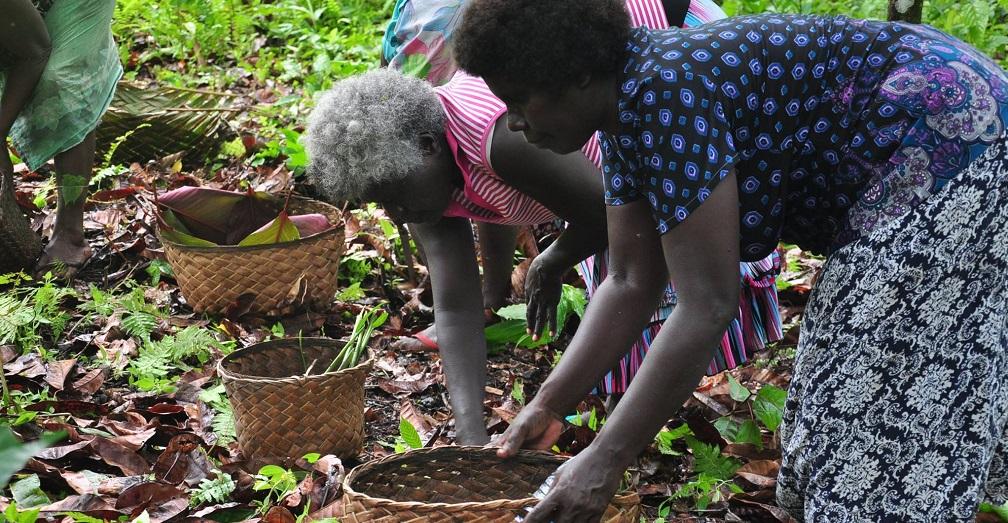As the COVID-19 pandemic continues to sweep across the Globe and linger on the doorstep of several Pacific countries, communities are already picking up the health, social and economic pieces scattered in its wake. Agriculture in the Pacific has been particularly challenged, suffering disruption of supply chains, farm labor, growing seasons and agricultural product distribution. In order to not just recover, but “grow back better” after the COVID surge, communities will need to rely on the fortitude of a strong and growing force in Pacific Agriculture – women.
SPC’s Land Resources Division (LRD) is celebrating the invaluable contributions of Pacific women agriculturalists for two weeks from July 20 to July 31 with a series of interviews and profiles, short films, infographics and podcasts that will help build the foundation for recovery and a thriving future for the region’s rural communities. The campaign will close with an awards ceremony recognizing the long-term contributions of women colleagues at the Land Resources Division that have dedicated their careers to women-led projects and capacity development.
The Women in Agriculture honoring will be informed by successful farmers such as Maryanne, who farms vanilla beans at Maleua Farm in Makefu Village, Niue. The income from her farm will act as a retirement fund, sustaining her when she retires as the Librarian of the University of the South Pacific campus in Niue. Maryanne also finds value in crop diversity, which will dampen agricultural shocks, such as current one caused by COVID-19. Her farm is an abundant medley of tropical fruit trees, bananas, vegetables and root crops such as tapioca. “Whenever we grow things on the land, we are connected to nature. We belong to land,” says Maryanne. “From the land we can make money, but we must also keep it for our children and pass it on as a gift.”
Though current successes will be commended throughout the two weeks, long-term challenges, as well as the future of women in agriculture, will also come to light. An upcoming interview with Loraini Baleilomaloma-Kasainaseva, a forestry specialist who leads LRD’s land use planning for its Ridge to Reef project, as well as the LRD REDD+ (Reducing Emissions from Deforestation and Degradation) project, reveals that country forestry officer teams are often disproportionally male, making up to 80 or 90 percent of the team, while normally only 10 to 20 percent are female. Loraini has adjusted to this imbalance in part through excellent team communication and passion. “I think it is awareness,” Loraini states in regard to getting more women involved in forestry. “We have agriculture and geography, but more awareness is needed at the secondary school level so that youths know there are schools and universities that have Bachelors and Masters Degrees in forestry or resource management.”
The future, for now, will be defined by a robust post-COVID-19 strategy. Women’s collectives, such as the Nadroumai Women’s Club Nursery on Fiji’s heavily touristed Coral Coast have built resilience into their agricultural efforts by pooling their resources. Faced with their lagoons being filled up due to sediment runoff caused by development and deforestation, the Nadroumai Women worked with NGO and university partners to form the ACIAR (Australian Centre for International Agricultural Research) funded Enhanced Agroforestry Systems Project. The project has a prospering vegetable, coffee and indigenous nuts operation, and this year has secured 1.5 additional acres of private land to expand its food and tree production. It is well placed to step into a new era of prosperity as COVID-19 fades.
These successes will add to a diversity of other women in agriculture stories during the celebration, affirming women as the vanguard of the Pacific’s future agricultural bounty. Collaborative stories with LRD partners ACIAR and CropTrust, the Centre for Pacific Crops and Trees (CePaCT) and the Australian Government Department of Foreign Affairs and Trade (DFAT) will tackle women’s contributions to food security and COVID-19 recovery, women’s economic empowerment and professional success in the field borne from close collaboration and unflappable dedication. Join us we take on the agricultural response to COVID-19 with stories of empowerment, and celebrate, educate, and elevate these outstanding women keeping our food, culture and community alive.
